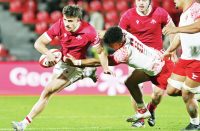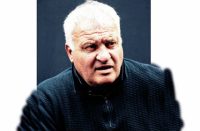 The striking similarities between Julian Savea and Nehe Milner-Skudder extend beyond the fact that each has scored eight tries in his last eight Tests for the All Blacks.
The striking similarities between Julian Savea and Nehe Milner-Skudder extend beyond the fact that each has scored eight tries in his last eight Tests for the All Blacks.
Six weeks into the New Zealand season, both are missing in action, albeit for very different reasons. Savea has been dropped by the Highlanders amid concern over his general fitness not being what it ought to be and his double-barrelled accomplice is awaiting surgery on a shoulder reconstruction.
He has already been ruled out of the All Blacks’ first matches as double champions, against Wales in June. The good news for the second best team in the Six Nations extends beyond the current state of the wings last seen giving Australia the run-around at Twickenham last October.
Brodie Retallick, by some distance the best second-row forward in the world which, given the competition, really is something, broke a few ribs three weeks ago and is not expected back until May. Flanker Jerome Kaino has also been forced to make an emergency pit stop for a damaged shoulder and full-back Israel Dagg has still to get his season off the ground because of a similar injury.
If the first Test against Wales had been taking place next month instead of June, the holders would have been missing eight of the world-beaters at Twickenham five months ago. Five, of course, have retired – Richie McCaw, Dan Carter, Conrad Smith, Ma’a Nonu and substitute hooker Keven Mealamu.
At the last count just before close of business on Friday night, fewer than half of New Zealand’s last starting XV were still standing. The Kiwis have enough conveyor belts to guarantee them
immunity from the man-power crisis that occasionally bedevils lesser countries but it is a fact that right now just two of their backs from the last World Cup final are in full working order – full back Ben Smith and his scrum-half namesake, Aaron.
The casualty list includes the newest of their Test wings, Waisake Naholo. The Fijian, who made the World Cup despite breaking a leg against Argentina last August, has broken it again with no guarantee of recovering for the first skirmish against Wales on June 11.
Nobody can match the All Black propensity for propelling wings into the Test arena with instant success but a lengthening casualty list may force them to recall one of their more senior citizens for the start of the Welsh series. Cory Jane could well find himself on a come-back at the age of 33.
Wales will hardly be rubbing their hands in glee at the prospect. They have been hit by an entire squadron of wings during their periodic thrashings in New Zealand from John Kirwan and Terry Wright in the Eighties, Jonah Lomu, Jeff Wilson and Christian Cullen in the Nineties, through to Joe Rokocoko, Sitiveni Sivivatu and Savea.
Of the four home countries, only England have won a Test in New Zealand, in 1973 and again 30 years later when their six-man pack famously survived a series of five-metre scrums despite two-thirds of their back-row – Lawrence Dallaglio and Neil Back – watching from the sin-bin.
When it comes to the All Blacks, Wales have been nothing if not consistent. Where Scotland and Ireland have punctuated their losing runs with the odd draw, Wales have been beaten in all 27 matches against the All Blacks since their last win in 1953.
At the risk of tempting fate, the first of the three Tests in June surely offers them a better chance of ending that run than at any time since Clem Thomas’ famous cross-kick led to Ken Jones’ decisive try at Cardiff Arms Park towards the end of Coronation Year.
Whether they are bold enough to take it is another matter.
Their failure to deliver on the two
most challenging days of the Six Nations, in Dublin and at Twickenham, hardly suggests they are about to take advantage of an All Black shorn of five players festooned by a grand total of 589 caps.























